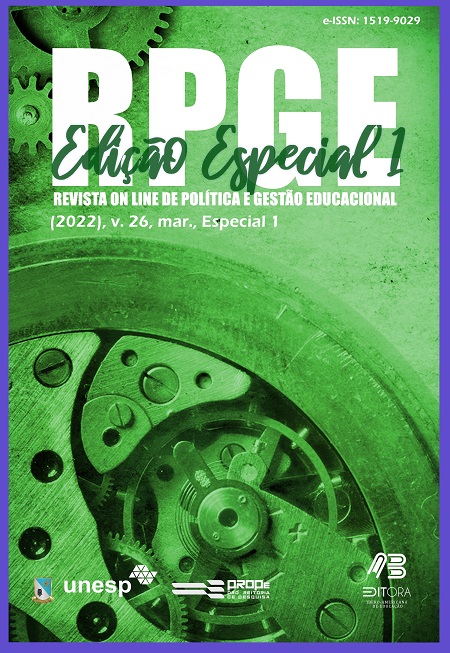Sociedade da informação
Abordagem psicológica para sites de redes sociais (um estudo educacional)
DOI:
https://doi.org/10.22633/rpge.v26iesp.1.16511Palavras-chave:
Sociedade da informação, FOMO, Sites de redes sociais (SNSS), Transtorno de déficit de atenção/hiperatividade TDHA), Saúde mentalResumo
O trabalho examina a abordagem psicológica dos sites de redes sociais (SNSs) e seu impacto nas pessoas. Não se pode afirmar categoricamente que as redes sociais trazem apenas benefícios ou danos. Existem redes sociais com foco restrito, que podem ser úteis para fins de trabalho, e multiuso, com enorme funcionalidade que garante tanto o cumprimento dos objetivos de negócios quanto o entretenimento. Elas podem ajudar a passar o tempo, mas também podem induzir o vício em pessoas com excesso de tempo. Consequentemente, a influência das redes sociais na sociedade é muito diversa e ambígua, e o impacto em um determinado indivíduo depende de qualidades subjetivas. Como as redes sociais são um fenômeno relativamente recente, essa potencial relação entre seu uso e sentimentos de solidão e depressão ainda não foi devidamente investigada. O medo de perder (FOMO) é outro efeito de saúde mental que tem sido fortemente associado ao uso das mídias sociais.
Downloads
Referências
ANSARI, J. A. N.; KHAN, N. A. Exploring the role of social media in collaborative learning the new domain of learning Smart Learn. Environ, v. 7, p. 9-17, 2020. DOI: 10.1186/s40561-020-00118-7.
AZIZI, S. M.; SOROUSH, A.; KHATONY, A. The relationship between social networking addiction and academic performance in Iranian students of medical sciences: a cross-sectional study. BMC Psychol., v. 7, n. 1, p. 1-8, 2019.
BEKALU, M. A.; MCCLOUD, R. F.; VISWANATH K. Association of social media use with social well-being, positive mental health, and self-rated health: disentangling routine use from emotional connection to use. Health Educ. Behav., v. 46, suppl. 2, p. 69-80, 2019.
BOUYGUES, H. L. Social Media Is a Public Health Crisis. Let’s Treat It Like One. U.S. News, 2021. Available: https://www.usnews.com/news/health-news/articles/2021-07-20/social-media-is-a-public-health-crisis. Access: 10 Out. 2021.
COPPES, M. J. Teens and Social Media: When is it too much? University of Nevada. Scool of Medicine, 2019. Available: https://med.unr.edu/news/archive/2019/coppes-teens-and-social-media. Access: 10 Jan. 2021.
DANIELS, N. How Does Social Media Affect Your Mental Health? The New York Times, 2021. Available: https://www.nytimes.com/2021/10/01/learning/how-does-social-media-affect-your-mental-health.html. Access: 10 Jan. 2021.
EDMONDS, R. Anxiety, loneliness and fear of missing out: The impact of social media on young people’s mental health. 2021. Available: https://www.centreformentalhealth.org.uk/blogs/anxiety-loneliness-and-fear-missing-out-impact-social-media-young-peoples-mental-health. Access: 10 Jan. 2021.
HOLTERMANN, C. Should There Be Separate Social Media Apps for Children? The New York Times, 2021. Available: https://www.nytimes.com/2021/04/19/learning/should-there-be-separate-social-media-apps-for-children.html. Access: 10 Out. 2021.
KOLHAR, M.; AHMEDKAZI R. N.; ALAMEEN A. Effect of social media use on learning, social interactions, and sleep duration among university students. Saudi Journal of Biological Sciences, v. 28, n. 4, p. 2216-2222, 2021.
MORIN, A. What Your Facebook Use Reveals About Your Personality And Your Self-Esteem. Forbes, 2014. Available: https://www.forbes.com/sites/amymorin/2014/10/31/what-your-facebook-use-reveals-about-your-personality-and-your-self-esteem/?sh=64f04fbc321f. Access: 10 Jan. 2021.
NITTLE, N. How Does Social Media Play a Role in Depression. Very Well Mind, 2021. Available: https://www.verywellmind.com/social-media-and-depression-5085354. Access: 10 Out. 2021.
NORTON, A. Too Much Social Media Time Could Raise Risk of Depression. Web MD, Health Day, 2020. Available: https://www.webmd.com/depression/news/20201214/too-much-social-media-time-could-raise-risk-of-depression. Access: 10 Out. 2021.
POPLAVSKIY, M. M. Azbuka pablik ryleyshnz: navch. posib. dlya stud. vyshch. navch. zakl. [Alphabet of public relations: textbook for students of higher educational establishments] Kyiv: Delta, 117, 2007.
POPLAVSKIY, M. M. Sotsialni merezhi yak kulturno-prosvitnytskyi resurs [Social Networks as a Cultural and Educational Resource]. Ukrainian Information Space, 73, 2020.
RYBINSKA, Y., LOSHENKO, O., KURAPOV, A., PONOCHOVNA-RYSAK, T., & KHOLMAKOVA, Y. The change in the concept of virtue during the COVID-19 pandemic. Amazonia Investiga, v. 10, n. 47, p. 62-69, 2021. Available: 10.34069/AI/2021.47.11.7
RYBINSKA, YU. A. Lingvo-Sociocultural Specific of Talk Show Translation as a TV Discourse Genre. Psycholinguistics, Pereyaslav-Khmelnytsky State Pedagogical University named after Hryhoriy Skovoroda, v. 23, n. 2, p. 192-202, 2018.
RYBINSKA, YU. A. Methodical foundations of the professional communicative preparation of future philologists by means of creative writing. Bulletin of Zhytomyr State University named after Ivan Franko, v. 92, n. 1, p. 5-9, 2018.
SINGKH, A. Positive and negative effect of social media on education. 2020. Available: https://www.theasianschool.net/blog/positive-negative-effect-of-social-media-on-education. Access: 10 Jan. 2021.
Downloads
Publicado
Como Citar
Edição
Seção
Licença
Copyright (c) 2022 Revista on line de Política e Gestão Educacional

Este trabalho está licenciado sob uma licença Creative Commons Attribution-NonCommercial-ShareAlike 4.0 International License.
Manuscritos aceitos e publicados são de propriedade da Revista on line de Política e Gestão Educacional. É vedada a submissão integral ou parcial do manuscrito a qualquer outro periódico. A responsabilidade do conteúdo dos artigos é exclusiva dos autores. É vedada a tradução para outro idioma sem a autorização escrita do Editor ouvida a Comissão Editorial Científica.











